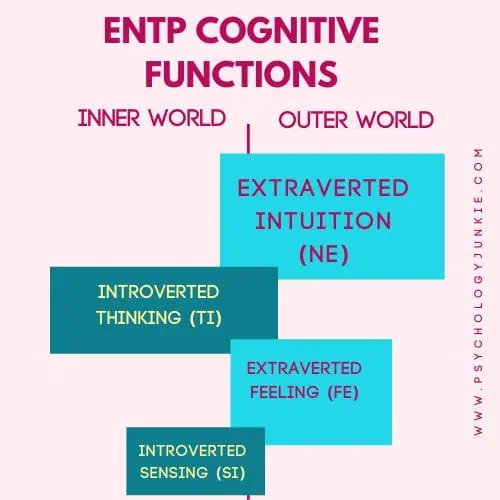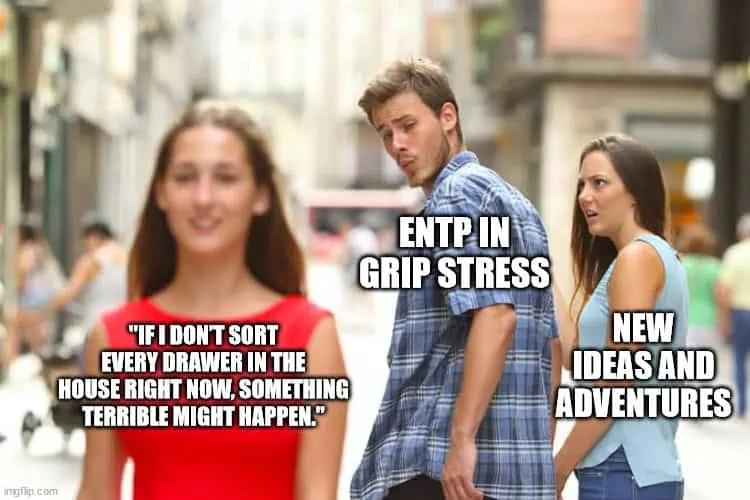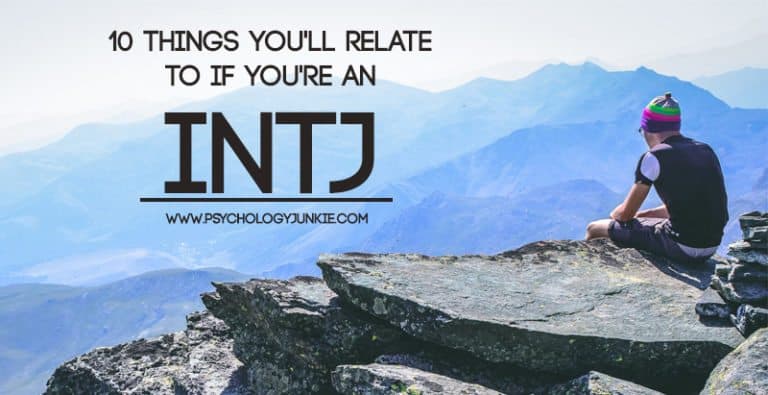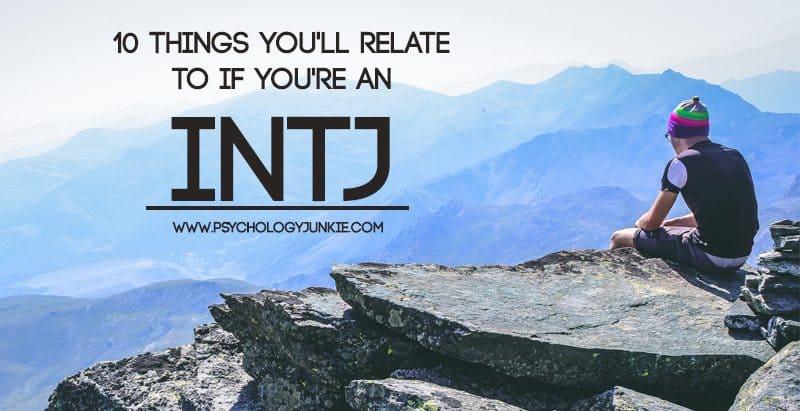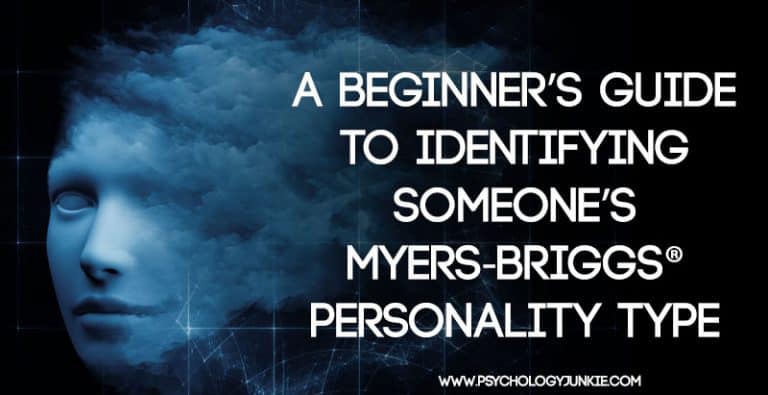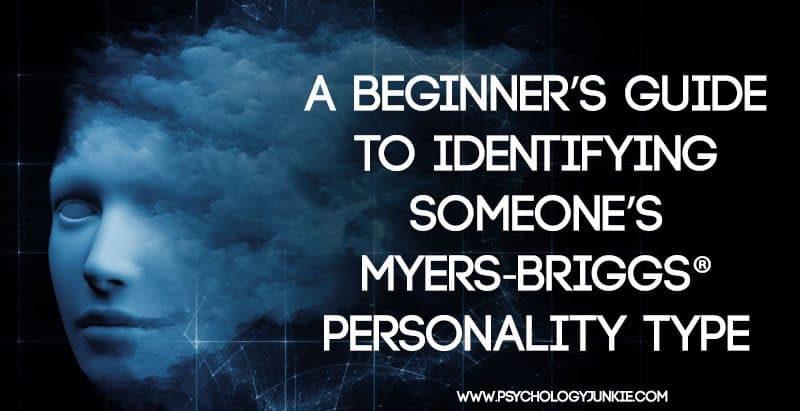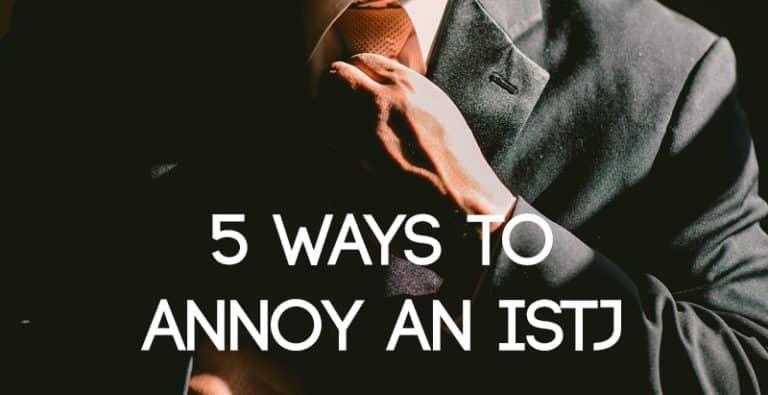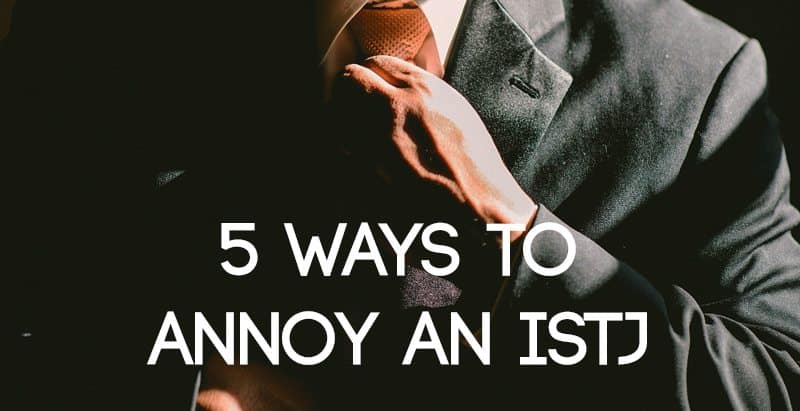The ENTP and Grip Stress: What it Is and How to Cope
As an ENTP, you’re known for your inventive mind, knack for spotting new possibilities, and endless curiosity. You’re the one diving into projects, generating ideas, and often challenging traditions and norms. But even for you, there are days when everything seems to fall apart. It feels like no matter how much creative energy you throw at your problems, nothing seems to stick. This is when grip stress rears its head, pushing your mind into overdrive in all the wrong ways.
Naomi Quenk, a clinical psychologist and author on this topic, explains that grip stress causes us to “fall back” on our least-developed mental function. For ENTPs, this is Introverted Sensing (Si), a function that typically stays in the background but under high stress, takes the wheel, leading to behaviors that feel completely out of character.

Not sure what Introverted Sensing is? No problem. Let me give you just a brief overview of your cognitive functions. These functions are the mental processes you use to observe the world and make decisions.
Not sure what your personality type is? Take our new personality questionnaire here. Or you can take the official MBTI® here.
Your ENTP Cognitive Functions:
As an ENTP your dominant function is Extraverted Intuition, or “Ne” for short. This function is all about generating possibilities, ideas, forming connections, and finding unique relationships between disparate things in the outer world. It’s the part of you that can think up dozens of ways to start a new business while also hypothesizing about existentialism (and finding 20 related theories).
Your auxiliary function (or second in command) is Introverted Thinking, or “Ti” for short. This function is all about getting into the logic of how things work and looking for radical honesty. It’s the part of you that isn’t okay with surface-level answers, but wants to question, analyze, and study…always searching for more accuracy and precision.
Your tertiary function (third) function is Extraverted Feeling, or “Fe” for short. This function is all about getting into the emotional wavelength’s of the current moment. It’s the part of you that can “read” how people feel, crack a joke at just the right time, or smooth over situations that are starting to get tense. It’s also the part of you that wants connection with others, friendship, a positive interaction.
Your inferior function is Introverted Sensing, or “Si” for short. This function is all about consistency, routine, details…you know, all the stuff that you tend to avoid as an ENTP. Because this is your inferior function, you tend to feel a bit vulnerable or uncertain in its energy. Rather than setting up regular routines you tend to chase after new possibilities and novel ideas. That said, you also have moments where you really wish you could just settle down, relax, and enjoy some peaceful homeostasis.
What Causes the Grip?
When you first encounter stress, your first reaction is to throw all your Extraverted Intuition at the problem. You’ll brainstorm possibilities, ideas, solutions, and access that inventive part of your mind. After all, Extraverted Intuition is the “hero” of your personality. What else would be better to solve the problem?
But what if stress doesn’t decrease? What if Extraverted Intuition isn’t solving the problem? What if thinking and analyzing isn’t solving the problem? If you’re like most ENTPs, you keep trying and trying to solve the problem with the same two tools (Ne and Ti). Over time, those tools start to wear down. In fact, they pass out on the bed and leave everything to the kids, or in this case, the kid (Introverted Sensing).
This is the moment where your inferior function, Introverted Sensing, can finally take the wheel. Never mind that it’s the function you feel most uncertain about, the one you trust least. It’s in charge now that “mom and dad” (Ne and Ti) are away. This tends to create all kinds of confusion for you as an ENTP. Suddenly the part of yourself that you usually avoid is at the helm, guiding you to act in ways that you’d never ordinarily think of.
How Grip Stress Shows Up for ENTPs:
1. Fixating on Details
Normally, you’re all about the big picture, generating ideas and piecing together patterns in unique ways. But in the grip, your focus narrows drastically, and you become obsessed with small details. You might find yourself trying to perfect every part of a project, no matter how minor. It’s like suddenly needing to paint a masterpiece with a single-hair brush—frustrating and never quite “right.”
2. Escalating Small Issues
Under grip stress, minor problems can feel enormous. Maybe you’re facing a deadline or dealing with a minor glitch in a project. Instead of brushing it off, your mind can blow it up, seeing it as a massive, insurmountable issue. Small setbacks feel overwhelming, and you may find yourself spiraling into “what-if” scenarios, convinced that a minor problem spells disaster.
3. Obsessively Organizing or Tidying Up
Grip stress can trigger an urge to find control through organizing or cleaning. You might start organizing files, arranging books, or tidying up your desk with almost obsessive precision. It’s almost ironic—usually, the little details aren’t your thing, but in grip mode, they suddenly take on a sense of urgency and importance.
4. Struggling to Verbalize Thoughts
ENTPs are great talkers, known for their quick wit and expressive ideas. But during grip stress, that easy flow of words feels blocked. Suddenly, explaining your thoughts is a struggle. Your mind feels foggy, and you might find yourself feeling frustrated, unable to express even simple ideas without stumbling over your words.
5. Physical Sensitivity
Ever get a random ache or twinge and suddenly feel convinced it’s a sign of something serious? In grip stress, ENTPs can become hyper-aware of physical sensations, sometimes interpreting normal aches or tiredness as signs of illness. You might start feeling anxious, worried that every little sensation is something major.
6. Becoming Reserved and Distant
Your usual social spark fades, and you find yourself retreating, preferring to avoid people rather than engage with them. You might come across as distant or even cold, surprising those who know you as a usually engaging, open-minded conversationalist.
My Own Experiences:
As an MBTI® practitioner, I’ve spoken to dozens of ENTPs who’ve struggled with grip stress. Time and time again I hear them explain how they tend to become more like hypochondriacs, fixating on physical details they’d normally never notice or waste time worrying about. One ENTP I know texted me a quote to use in this article, “The key for me is to CHILL OUT. I mean that. Just stop. Have a drink of ice water, take a bath, eat something that isn’t Doritos. Sometimes I run or exercise, but usually I just take a nap. Then I need to just let it all out with someone and say all the crazy thoughts in my mind so I can get it out of my system. That’s key for me.”
Another ENTP I’ve worked with has shared, similarly, how grip stress makes her obsessive over the details and cleaning in particular. Nothing seems clean enough. She copes by meditating, getting away from sensory stimulation, and focusing on her breath. “So much can be healed through breathwork. We don’t breathe the way we should most of our lives; we’re too stuck in our own minds.”
How to Get Out of the Grip: Tips for ENTPs
Thankfully, grip stress doesn’t last forever. It might feel interminable (believe me, I’ve been there) but it does end. And you can pull yourself out of the grip by trying out some of these solutions:
1. Change the Scene
When you’re in the thick of it, sometimes the best thing you can do is literally move. Go outside, walk around, or just switch up where you’re sitting. Getting a new perspective can help shake off that narrow, detail-focused mindset and give your brain a little “refresh.”
2. Check In on Basic Needs
This might sound too simple, but sometimes grip stress happens because you’re hungry, thirsty, or just plain tired. As an Extraverted Intuitive, you tend to be more “heady” than physical. Of course, there are exceptions. I’ve known athletic ENTPs to be sure. But one of the downsides of having inferior Introverted Sensing is that it’s harder to stay in touch with your body. You might get so caught up in ideas or thoughts that you forget to drink, eat, or sleep. Do a quick check: Am I hungry? Thirsty? Sleepy? If the answer is yes to any of these, handle it! A snack, a glass of water, or even a quick nap can make a world of difference.
3. Take Some Time Alone
Even the most extroverted ENTPs need a break. Take a little quiet time to recharge, away from all the usual demands of people and conversation. This can help you reset and refocus without the pressure to be “on” for others.
4. Vent to a Friend
AFTER you’ve had a little break, some alone time, and checked that you’ve actually had a meal in the last 24 hours, try to express your feelings and thoughts to someone who can let you just unload. Make sure this person knows you may say things you don’t fully mean; you just have to verbally process, and sometimes that’s messy. The act of just getting your feelings out can help you to sort through them, organize them, and then have a little more perspective.
5. Try a Calming, Hands-On Activity
Since grip stress pulls you toward Sensing, try using Sensing, but in a low-key, healthy way. A simple, hands-on activity like organizing a drawer, going for a walk, or even baking something might help. Doing something practical can give you that sense of control and grounding without spiraling into hyper-detail mode.
6. Laugh it Off
ENTPs love a bit of humor, so here’s the perfect chance to turn that humor inward. Remember, this is just a phase, and it’s not the real you. So go ahead, laugh at the absurdity of you obsessing over tiny details or organizing your desk. This mental break reminds you that “detail-obsessed ENTP” is just a temporary persona.
7. Reconnect with Your Big-Picture Vision
Once you feel the confusion lifting and Extraverted Intuition gets back into the driver’s seat, it’s time to reconnect with what you love most—those big ideas. Spend a few minutes thinking about your goals, projects, or dreams. Jot down ideas or share them with someone you trust. This process helps you return to that broad, idea-driven perspective you thrive in.
Other Articles You Might Enjoy:
24 Signs That You’re an ENTP, the Trailblazer
What Do You Think?
Was this article helpful? Do you have any stories or suggestions for fellow ENTPs? Let us and other readers know in the comments! We’d love to hear from you!
Discover even more about your personality type in our eBook, Discovering You: Unlocking the Power of Personality Type.
Subscribe to Our Newsletter

Want to discover more about personality type? Get the inside scoop with Susan Storm on all things typological, along with special subscriber freebies, and discounts on new eBooks and courses! Join our newsletter today!


